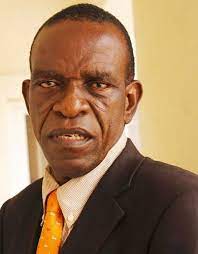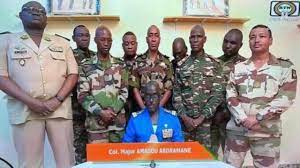
By Ike Abonyi
“The most serious failure of leadership is the failure to foresee.” – Robert K. Greenleaf
By default, democracy has a way of letting off steam. It is said that power belongs to the people in a democratic setting because the elected public officers periodically face the electorate for reelection. The voters ultimately determine whether they deserve another term of office.

In a democratic setting, the people are the principal stakeholders and technically, the employers of political leaders. They are like the teachers who set the examination questions after studies, do the marking, and release the result at the next election. This periodic review of leaders’ performances by the electorate contains the beauty of democracy when compared to other forms of government that concentrate power on a select few.
Where elections are not free, fair, and credible, it denies the people their inalienable and imprescriptibly right and shifts away from democracy.
When such happens the government becomes legitimacy-challenged and suffers dearth of the people’s goodwill.
Every government requires aspects of popular goodwill to succeed. Goodwill cannot be bought or obtained via propaganda and glib-talk advertorials. Goodwill is always earned. And the only practical way of keeping goodwill is to keep earning it. And earning the goodwill of the people entails meeting the people’s expectations of good governance. The importance of goodwill in tackling problems can be better understood from the position of the late iconic South African hero, Nelson Mandela: “Where people of goodwill get together and transcend their differences for the common good, peaceful and just solutions can be found even for those problems which seem most intractable.”
Proponents of democracy envisage that abuse of democratic tenets could occur once in a while when the people’s will are abridged or sidelined by overbearing leaders who bulldoze their way to power. When that happens the same democracy provides that the people have the right to react within the ambit of the law. They can go to court to seek redress or judicial restraint. They can protest (peacefully) without rioting. The leaders are supposed to listen and address their grievances.
In Africa, democracy often runs into a hitch, especially when the people are ignored despite the genuineness of their grievances. Rather than address the points of the protesters, the leaders use their positions to suppress the people, the truth, and the courts. In some instances, It’s even made worse when the judicial pronouncements are disdainfully flouted whenever they do not favour the establishment.
The logjam now is that there is even an arbitrary and despotic show of power when the people try to express themselves: they are arrested, incarcerated, and often killed. In such a situation, what do the people do?
When the one who finds his way into power through flawed elections rolls out draconian rules against the people, what should the people do?
In Africa, especially In Nigeria, the people have been taking this in the hope that things will improve but it never changes, how should the people react? As a result, some frustrated ones self-exile to where the rule of law prevails. Some of them, like Nnamdi Kanu and Simon Ekpa, wonder why their country cannot be like where they are and may decide to fight back from yonder. Their method of fighting may not be good and proper but the truth remains that they are the creations of a bad system. The easiest and fastest way to nip them is to tackle the evil that led to their emergence, that is, bad governance and corruption.
Some of the dispirited who stay back may turn to either guerrillas, terrorists, bandits, or unknown gunmen. Others, more civil but still disgusted may come up with a better way of protesting without being killed or arrested. That is where to locate the sit-at-home that is popularised by IPOB in the SouthEast region. This method allows the illegitimate government to carry on with their inordinate and preposterous activities but with pressures resulting from the people’s show of disenchantment and dubiety.
The real challenge now is where all these measures fail and, election after election, the will of the people is hijacked and nationhood is not serving the people. The commonwealth of the people is looted in broad daylight and positions shared among families of the ruling class with the rule of law disrespected. What should the people do, especially when the brunt of the misrule is biting them, with more and more people being downgraded into abject and multidimensional poverty? What should the populace do in such circumstances, especially when the international community after the initial gra-gra against the anti-democratic policies, turns around to join and legitimise them and fend their selfish interests?
The only thing that makes sense to the West is when we flood the streets in protest, challenging the system even violently. As we get killed it attracts them and only then does our matter make news to them. But rather than project themselves for needless punishment even fatally, the people came up with sitting at home as a subtle way of engineering a revolt against rot occasioned by wily politicians.
That was the case of IPOB resurrected from the ashes of marginalized peoples of the South East. It seeks to get the people to separate from “federal” Nigeria if they cannot be accommodated, the government rose in anger and outlawed them as a terrorist group. Their leader Nnamdi Kanu, now in detention, was arrested and charged with treason but the government was unable to prove that an emancipator is a terrorist. Court then ordered his release but the security agencies and government officials ignored the court and kept him.
Instead of jumping to the streets to protest for his release of their idol and getting killed in the process, the people instead chose to do a sit-at-home protest. This they have done successfully for nearly one year. The populace, understanding the position of IPOB and the need to release Kanu decided to obey the directive every Monday, sitting at home until he is released.
The sit-at-home has now been hijacked by some criminals but the government whose primary duty as enshrined in the constitution is to protect the lives and property of the citizens is feigning ignorance and allowing the criminals to hold sway. The oppressors, instead of considering releasing the man whose incarceration is causing the problem, are instead pushing to have more people for possible incarceration.
The people came out to vote on February 25, determined to make changes for good, and believing that their vote will count to begin the process of creating a new Nigeria, instead, the man who did not win was foisted on them. In the face of such an unconcealed and audacious show of power, what should the people do when all avenues to seek redress are being blocked?
If Nigeria is sincerely interested in peace and harmonious living, why not respect the court order and free Kanu, and bring peace to that region? The security operatives cannot prove that they are more Nigerian than the learned judges who think Kanu should be a free man. The rule of law may be intangible but it’s the substratum of any democracy. It’s a critical consideration for investors before venturing with their resources to any country.
How can the people pledge their loyalty, and goodwill to a government that conspicuously and in an obvious manner disobeys court orders not once not twice? Suspended Central Bank Governor, Godwin Emefiele, like Kanu, is in detention even after the court released him on bail. Operatives of a sister agency were publicly manhandled in the court premises in Lagos by hooded gun-toting DSS operatives for trying to enforce a court order. A high court gives order and an agency of the state disregards it and goes further to stage a show of shame in a supposed democratic setting.
And such a government is not burdened by the immorality of double standards in challenging the military juntas in the Niger Republic. Is military usurpation of power not as guilty as electoral usurpation, using the same security operatives to suppress the people? We may be deceiving ourselves to keep thinking that because Nigerians desire democracy anything evil wearing the garb of democracy will suffice. Not at all, any government that is not flowing from the votes of the people is not a democracy.
The people of Niger who are jubilant that the military sacked a democratic government are just reacting to the flagrant abuse of the tenets of democracy. If you want to change or improve a system, start with yourself and be more convincing, no preacher gets a following doing the opposite of what he preaches.
It’s duplicitous for Nigeria, one black pot, to call the Niger Republic, the kettle, black. If Nigeria’s judiciary fails to steady the derailing train of democracy In Nigeria as witnessed on February 25, they would have pushed the people to be wishing for any option of redress including coups. God help us escape the extreme.




GIPHY App Key not set. Please check settings